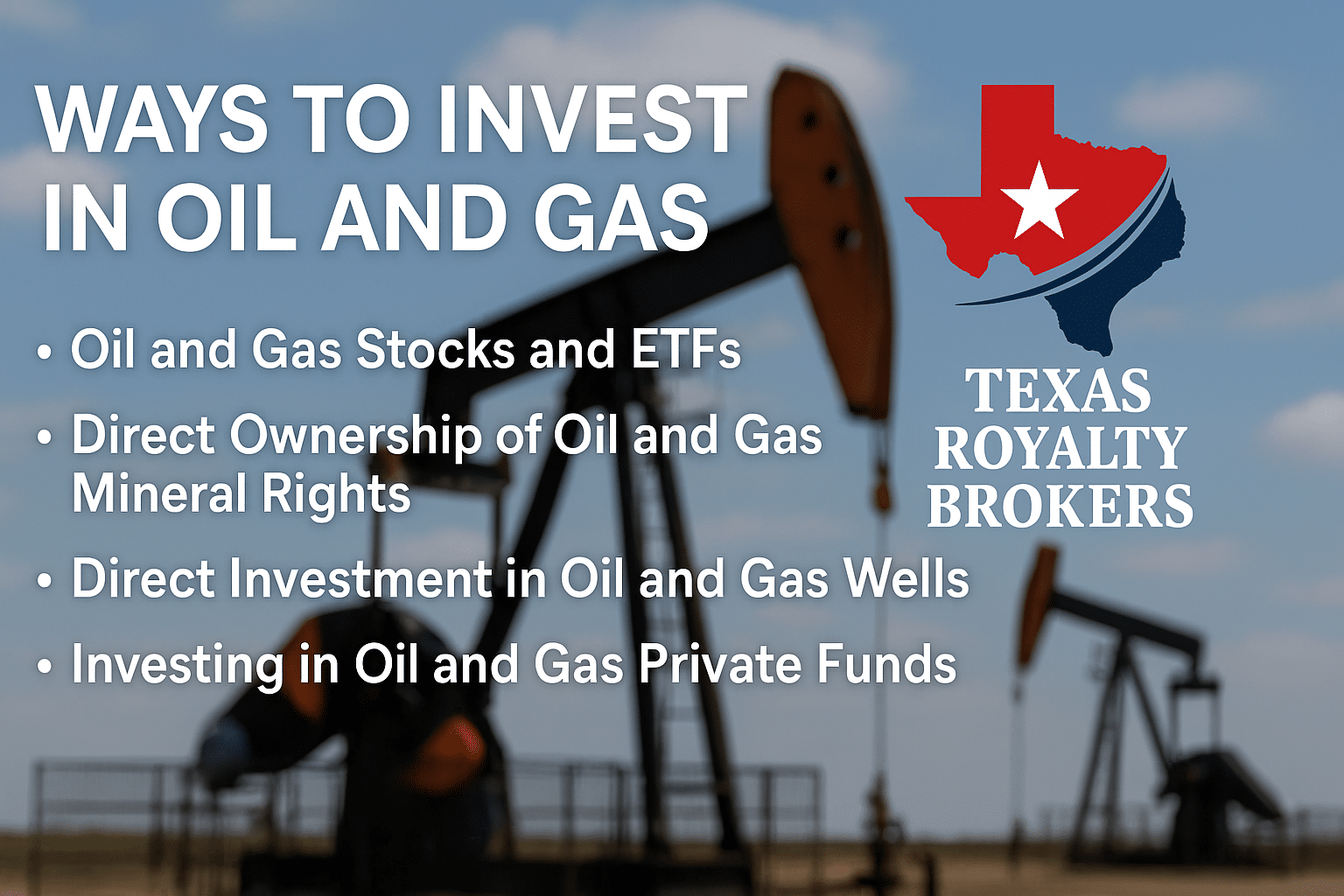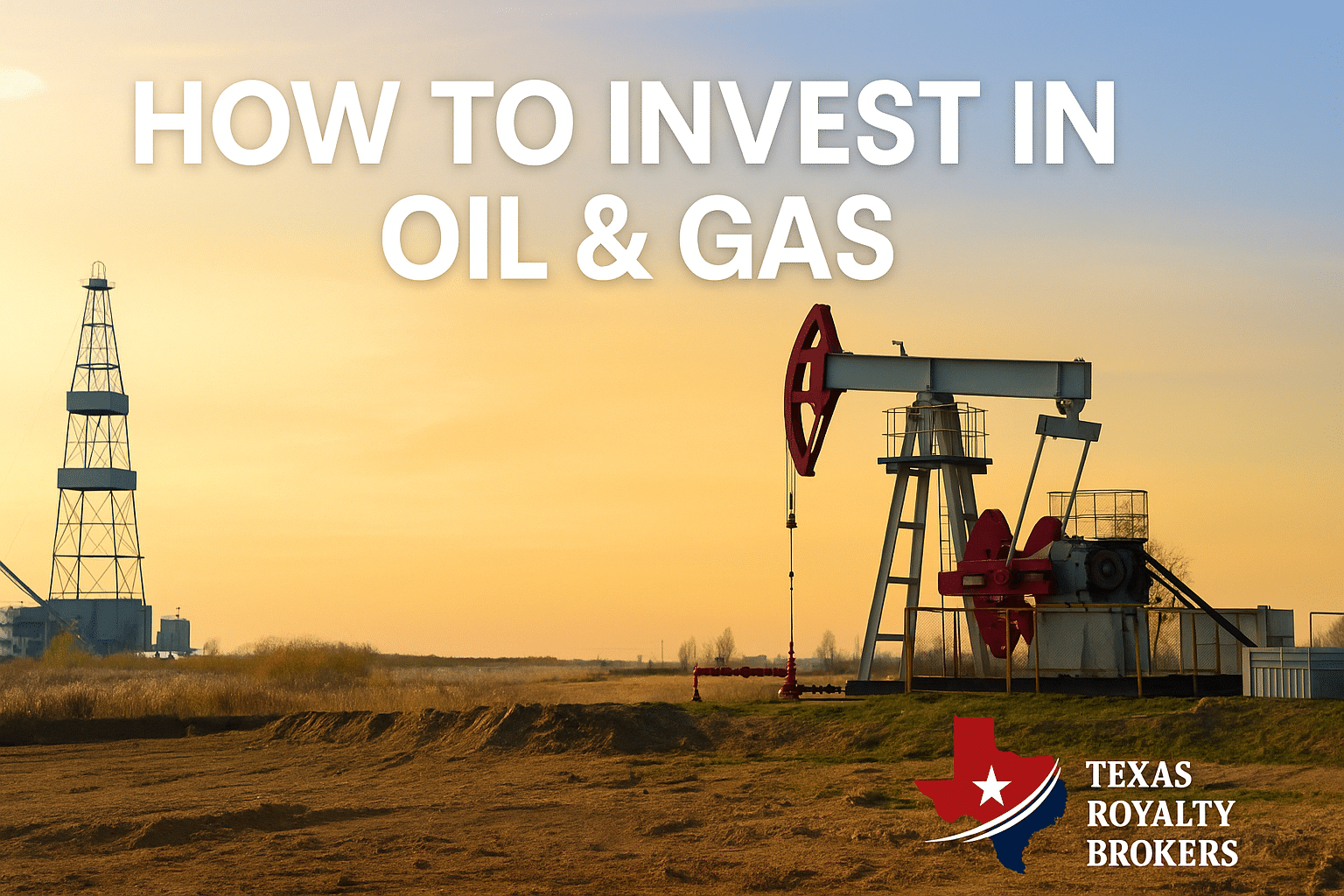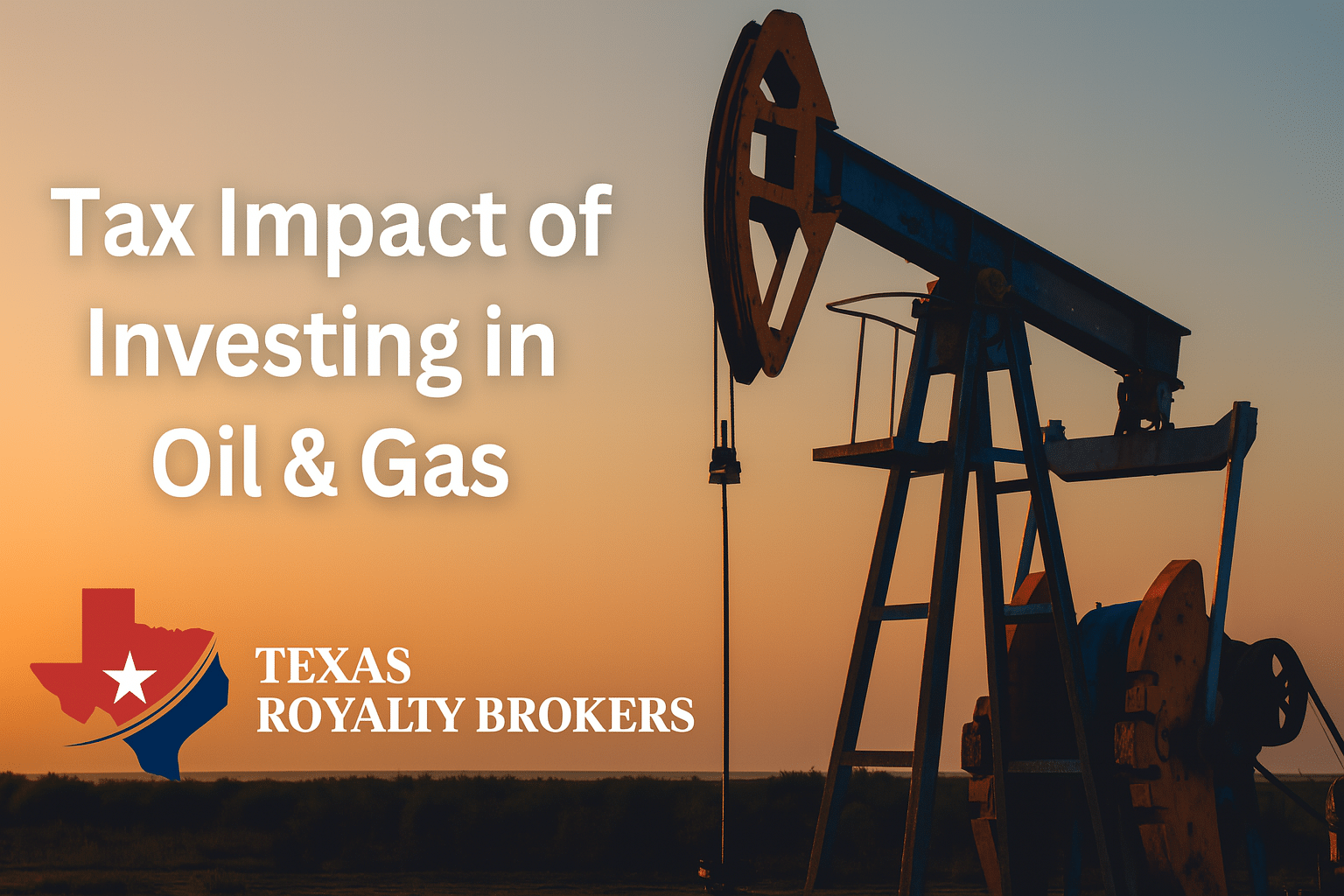Why Texas Royalty Brokers?
sellers
Buyers
State Specific Guides
Resources
How to Invest in Oil and Gas in 2026
In this guide, we show you exactly how to invest in oil and gas. There are some traditional ways to invest in oil and gas, and some other ways to invest that you may not have heard about or considered. We will guide you through each option and help you understanding whether investing in oil and gas is the right decision for you.
Investing in oil and gas can be an attractive way to diversify your portfolio, gain exposure to the energy market, and potentially tap into significant returns. However, this is a difficult industry to understand and there are many ways to invest. We’ll break down each option for you and help you better understand the best ways to invest in oil and gas.
If you have questions about investing in oil and gas, buying mineral rights, or need more information, simply reach out to us for a free consultation.
Should you Invest in Oil and Gas
As you grow your investment portfolio you might be looking for ways to diversify. Looking for alternative investments is a normal part of that process and oil and gas is worth taking a closer look.
Before you decide to invest in oil and gas, it’s important to consider your overall investment objectives.
Are you looking for passive income?
Are you looking for high risk / high reward asset class or something low risk?
Do you want to invest significant time and capital in the investment?
Do you already have a well balanced portfolio of assets?
How much capital are you trying to invest?
What is your time horizon?
While we can’t answer these questions for you, the answers to these questions will help you determine what types of investments you should make in oil and gas. There are many ways to invest in oil and gas so knowing your objectives prior to making an investment will be key.
Risks of Investing in Oil and Gas
Investing in oil and gas comes with some unique risks, especially if you’re new to the industry.
There’s a big knowledge gap for most people, and it can take time to understand how everything works—from drilling operations to market forces that affect prices. It’s not as simple as buying stocks in a tech company or investing in real estate. The oil and gas world has its own set of complexities, and without the right knowledge, it’s easy to make mistakes that could cost you.
Another thing to keep in mind is that oil and gas prices are constantly fluctuating. Political events, supply and demand, natural disasters, and even changes in government regulations can cause prices to swing wildly. If prices drop, it can significantly reduce the returns on your investment.
On top of that, the rise of clean energy and nuclear energy could impact the demand for oil and gas in the future. As the world shifts toward greener energy solutions, the long-term value of oil and gas investments might change, so it’s important to think about how these trends could affect your investment down the road.
If you are able to learn the industry and pick the right investments, it can be a very lucrative place to invest. However, there are many people who have lost fortunes in the oil and gas industry investing when they didn’t fully understand the investment.

Ways to Invest in Oil and Gas
As you explore opportunities to invest in oil and gas, the first thing you need to determine is how you want to invest. There are a lot of different ways to invest and there are pros and cons to each option.
Consider the following options carefully:
Oil and Gas Stocks and ETF’s
One of the easiest ways to invest in oil and gas is by purchasing stocks in large oil and gas companies or investing in Exchange-Traded Funds (ETFs) that focus on the energy sector. Stocks give you ownership in a company, while ETFs allow you to invest in a diversified group of companies, reducing some of the risk that comes with individual stocks.
The three largest oil and gas operator stocks by market cap are:
- ExxonMobil (XOM) – One of the biggest energy companies in the world, with a diverse portfolio of oil, gas, and chemicals.
- Chevron (CVX) – A major player in the global oil and gas industry, involved in both upstream and downstream operations.
- Shell (SHEL) – A global energy giant based in Europe, with significant oil, gas, and renewable energy assets.
If you prefer a more diversified approach, oil and gas ETFs allow you to invest in a basket of companies. The three biggest oil and gas ETFs by assets under management are:
- Energy Select Sector SPDR Fund (XLE) – This ETF focuses on the largest U.S. energy companies, primarily oil and gas operators.
- Vanguard Energy ETF (VDE) – Offers broad exposure to the U.S. energy sector, including both large and mid-cap companies.
- iShares U.S. Energy ETF (IYE) – Tracks the performance of large energy companies within the U.S., giving you exposure to the biggest names in oil and gas.
Both options—stocks and ETFs—can offer strong returns, but it’s important to understand the risks, especially with the volatility of oil prices.
Direct Ownership of Oil and Gas Mineral Rights
Direct ownership in oil and gas, such as buying mineral rights, can be a high-risk, high-reward investment. When you own mineral rights, you’re entitled to a portion of the oil or gas produced from that land, meaning you can earn oil and gas royalty income if production is successful. However, this type of investment comes with more complexity than simply buying stocks or ETFs. It requires a deeper understanding of how oil and gas fields work.
One of the key concepts to understand is decline curves, which show how production from a well decreases over time. Production tends to be highest at the beginning, then steadily declines as the well is depleted. Knowing how fast a well will decline is crucial in estimating how much money you could earn over time. You’ll also need to get familiar with estimated reserves, which are projections of how much oil or gas can be extracted from the land. These estimates help determine the long-term value of the investment but can be tricky to get right.
At Texas Royalty Brokers, we offer investors the ability to purchase mineral rights in Texas. While direct ownership offers the potential for strong returns, especially if oil and gas prices rise, it’s important to recognize the risks involved, from fluctuating prices to declining production.
Important: While we do have mineral rights for sale, we do not offer any type of investment advice to prospective mineral buyers. It is up to each mineral buyer to determine the price they want to pay and make their offers accordingly. A buyer must do their own due diligence.
Direct Investment in Oil and Gas Wells
Becoming a working interest owner in an oil or gas well means you’re investing directly in the drilling and production process. As a working interest owner, you get a share of the profits from any oil or gas the well produces. This can be a great way to earn significant returns, especially if the well hits a big production. However, this type of investment is high risk and comes with potential liabilities.
One of the main risks is that being a working interest owner makes you responsible for a share of the expenses. You’ll need to help cover the costs of drilling, operating, and maintaining the well. If something goes wrong, like a dry well or equipment failure, you’re still on the hook for your part of those costs. This means your investment can quickly turn into a liability, and you might end up spending more money than you make. Additionally, because well production naturally declines over time, your profits could decrease while the costs of maintaining the well continue.
While the potential rewards can be high, it’s important to understand the risks before investing in a working interest. We do not recommend investing in working interests unless you consider yourself and industry expert. If you own working interests, we recommend selling them immediately unless you understand the investment.
Investing in Oil and Gas Private Funds
Investing in private oil and gas funds can be a great way to access the high returns of the energy sector without directly owning wells or dealing with the complexities of the industry. These funds are typically managed by experienced professionals who pool money from investors to finance oil and gas projects, such as drilling new wells or acquiring existing oil assets. Unlike public funds like ETFs, private funds are not traded on the stock market and are usually only available to accredited investors.
The potential for high returns is one of the main attractions of private oil and gas funds. These funds often target specific high-reward projects, and if those projects are successful, investors can see significant profits. However, choosing the right fund is critical. Some private funds focus on higher-risk exploration projects, while others invest in more established oil fields. Understanding the fund’s strategy and the experience of the management team can make all the difference in how well your investment performs.
While we don’t make any recommendations for investments, start your research by looking at funds that make direct investment in oil and gas mineral rights.
Investing in LLC’s or Prospects
Investing in oil and gas LLCs or specific prospects can be very risky. These types of investments are often not liquid, meaning it’s difficult to sell your interest if you need cash quickly. They also come with a high level of risk, as success depends entirely on the specific project’s outcome. Even worse, these types of investments are sometimes targeted by scams, making it easy for less experienced investors to lose money. Because of these risks, it’s often better to avoid investing in LLCs or individual prospects unless you have a deep understanding of the industry and the project.
Tax Impact of Investing in Oil and Gas
Investing in oil and gas can offer unique tax advantages. Here are a few key areas to be aware of when it comes to the tax impact of oil and gas investments:
- Royalty Income Taxation: Income from oil and gas royalties is considered taxable income by the IRS. This means that any payments you receive from oil and gas production on your property must be reported. Royalty income is taxed as regular income, so it’s typically subject to both federal and state income taxes. However, because of the expenses involved in extracting and producing oil and gas, there are deductions you may be able to use to reduce your taxable income.
- Depletion Deduction: One major tax benefit for mineral rights owners is the depletion deduction. Similar to depreciation for physical assets, the depletion deduction acknowledges that oil and gas resources diminish over time as they’re extracted. This deduction allows you to write off a portion of your royalty income, effectively lowering the amount of income subject to tax. There are two types of depletion methods: cost depletion and percentage depletion. Percentage depletion, often the more favorable option, allows you to deduct a set percentage of your gross income from oil and gas royalties.
- Active vs. Passive Income Considerations: Income from mineral rights typically falls under passive income. However, if you’re directly involved in the business of oil and gas production, you might be able to treat it as active income, which could open up additional tax benefits. This distinction can affect the types of deductions you can claim and may be worth discussing with a tax professional.
- Intangible Drilling Costs (IDCs): If you invest in drilling activities, you might encounter IDCs, which are expenses related to drilling that don’t have any salvage value (e.g., labor, fuel, and repairs). IDCs can be deducted in the year they’re incurred, allowing investors to potentially deduct a large portion of their investment costs right away.
Our mineral rights tax article provides more in depth information for mineral owners who are trying to understand the tax impact of mineral rights.
While oil and gas investments can offer tax-saving opportunities, the specifics can get complex. It’s always a good idea to consult a tax advisor who understands the ins and outs of oil and gas taxation.
Selling an Oil and Gas Investment
Before you invest in oil and gas, you should consider how you will sell your investment in the future.
When it comes to selling oil and gas investments, ease of divestment varies widely depending on the type of investment you hold. Here’s a quick breakdown of the most common types and what to expect when you’re ready to sell.
- Stocks and ETFs: The easiest oil and gas investments to sell are publicly traded stocks and ETFs. Because these are traded on public exchanges, they’re highly liquid and can be bought or sold with the click of a button. If you own shares in an oil and gas company or a related ETF, you’ll likely have no trouble divesting whenever you choose, as long as the market is open.
- Mineral Rights: Mineral rights are also relatively easy to sell, especially in high-demand areas like Texas. If you’re considering putting your mineral rights up for sale, working with an experienced broker, like Texas Royalty Brokers, can make the process even smoother. Texas Royalty Brokers specializes in oil and gas mineral rights sales, connecting mineral rights owners with qualified buyers to ensure you get the best possible value. With expert knowledge and a network of potential buyers, selling your mineral rights becomes a hassle-free experience.
- Working Interests: Selling oil and gas working interests can be more challenging. Unlike mineral rights, working interests often come with ongoing liabilities, such as drilling costs, operating expenses, and potential environmental obligations. As a result, fewer buyers are interested, and the transaction process can be more complex and time-consuming. Buyers may also require more detailed financial information and a longer due diligence period, which can further slow down the sale.
- Private Oil and Gas Partnerships, LLC’s, or Prospects: Similar to working interests, private oil and gas partnerships, LLC’s, or prospects can be difficult or even impossible to sell. These are typically illiquid investments that do not have a straightforward secondary market, so finding a buyer can be challenging. Additionally, transferring ownership may require the partnership’s approval or adherence to specific terms outlined in the partnership agreement. In some cases, you may be forced to sell the ownership back to the partners or company who sold you the investment at a substantial loss. Unless you deeply understand the oil and gas industry and how these investments work, we recommend against this type of investment because they are difficult to impossible to sell.
Prior to making an oil and gas investment of any type, we strongly recommend considering your exit strategy. When it comes time to sell, you may have to take a significant financial hit depending on what type of oil and gas investment you made. A working interest or private investment in oil and gas will be very difficult to sell, while stock, ETF, or mineral rights sales will be much easier.
Questions about Oil and Gas Investments
Investing in oil and gas can be a profitable venture, but it also comes with a lot of questions. From understanding royalty income to navigating tax deductions, the complexities of mineral rights, and market timing, making informed choices is important to ensure you maximize the value of your oil and gas investment.
If you’re wondering about the best approach to maximize your mineral rights’ value, or if you’re unsure whether now is the right time to sell, reach out to Texas Royalty Brokers. We offer a free consultation to help answer any questions you have and guide you toward the best options for your unique situation. Our team is here to simplify the process and ensure you’re fully informed every step of the way.
Simply fill out the form below and our team will quickly respond.





